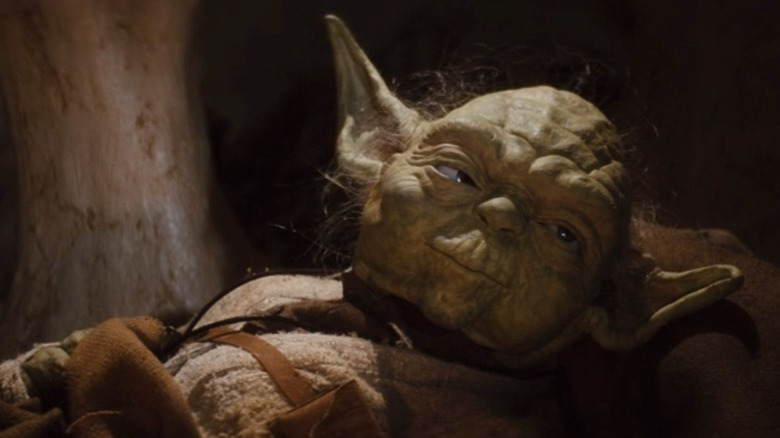Why The Oscars Refused To Nominate Star Wars' Frank Oz For His Yoda Performance
Yoda is an essential character in the "Star Wars" franchise. While "Star Wars" had sci-fi creatures aplenty up until his first appearance — mostly thanks to the Mos Eisley cantina sequence — it was the introduction of Yoda in "Empire Strikes Back" that showed the ability of George Lucas' franchise far, far away to spark the imagination. Indeed, Yoda is not just a character that opened the doors for all the great alien creatures of the prequels, but one that also encapsulated Lucas' skills at recruiting the best in the business to bring wildly inventive creatures to life.
Before Yoda became a digital puppet, Frank Oz made him a fully realized character with a distinct personality. Oz was not just playing some background alien, but infused the character with enough mystery and intrigue to spark countless speculation, including Yoda's backward syntax which has captivated and confounded audiences for decades.
As beloved as the character is, however, it wasn't recognized — like every other "Star Wars" performer — by award-giving organizations.
"After Frank Oz did Empire, I tried to get him nominated for an Academy Award; but we heard back that puppetry wasn't an art," George Lucas said in "The Making of Episode I The Phantom Menace." "I think it is an art — and Yoda represents the highest level of that art."
Indeed, as the book explains, Lucas instructed the puppet just as he did any other flesh-and-blood performer. "Acting is acting," Lucas continued, "whether it is a human actor, a CG character, or a puppet. It's all the same. Most people think of Yoda as being real, because he is the height of puppet artistry."
'Art is art'
This approach has a big impact not just on the audience, but the other performers, who see the puppet as a living actor. "The way Yoda came to life on the set was really special," Samuel L. Jackson added. "George would say, 'Action,' and Yoda was suddenly just there, doing his scene. And then George would say, 'Cut,' Frank Oz would take his hand out, and Yoda would slump over as if he was hungover or not feeling well. And you felt like, 'Man, somebody help Yoda!'"
Of course, Yoda would not be the last time the Academy would just refuse to recognize this sort of performance. While "The Lord of the Rings" movies won Oscars for visual effects, Andy Serkis' performance as Gollum wasn't recognized (though he did win an MTV Movie Award).
The same thing happened with the "Planet of the Apes" trilogy also starring Andy Serkis. By this point, the use of motion capture had become more well-known and prevalent in the industry. As fantastic as Serkis was as Caesar, however, and as lauded as the character was, not even campaigns from fans and even the studio itself helped dissuade the Academy.
The Academy has always been quite slow to recognize new contributions to cinema, whether it is puppetry or motion-capture performance or stunts. Hopefully this changes sooner rather than later.

